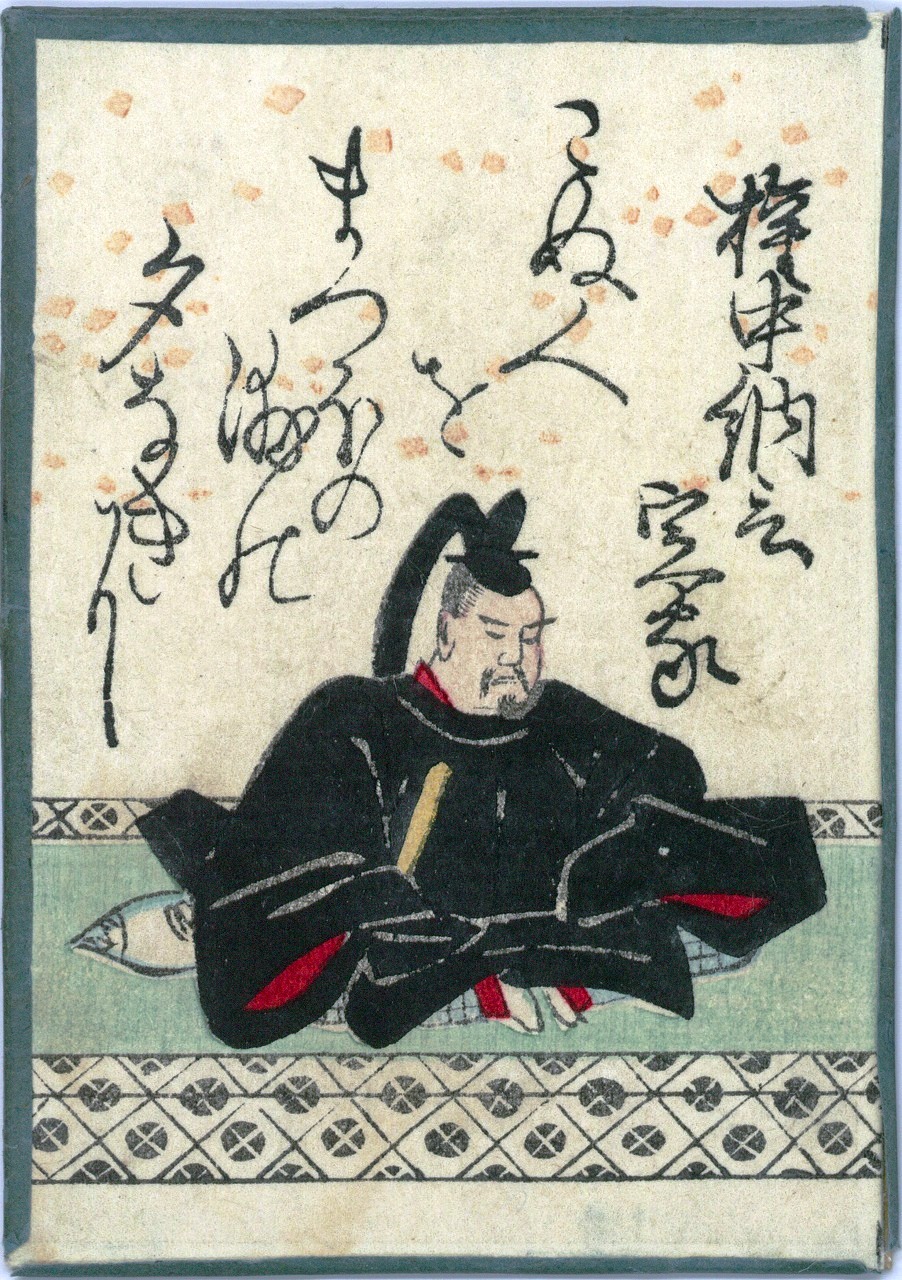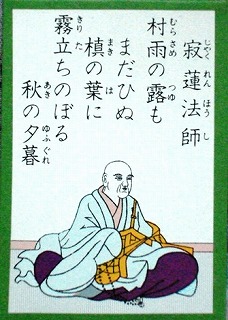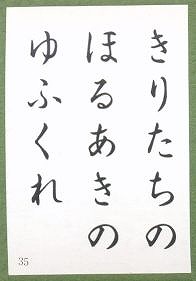
What is Ogura-Hyakunin Isshu?
Ogura Hyakunin-Isshu(小倉百人一首)is the name of the anthology of 100 poems selected by Fujiwara no Teika(藤原定家, 1162-1241)in 1235. Teika is considered one of the greatest poets in Japanese history.

Fujiwara no Teika depicted on a Karuta card produced about
100 years ago in the Meiji period.
The 100 poems cover famous poets and writers from the 7th to the 13th Century. The anthology is a concise representation of Japan’s early literature. Hyakunin-Isshu means ‘one poem each from 100 authors’. Ogura is the name of an area in Kyoto city, then the Japanese capital, where Teika’s mountain villa was located.
These poems were originally selected to write in calligraphy on Shikishi (色紙)square cardboard panels to decorate the mountain villa of the father-in-law of Teika’s son. Later, the set of the poems was published as a booklet, and became part of the basic education system. These poems are still taught in schools in Japan today and many are very familiar to Japanese, as Shakespeare is to Britons or Tangshi (唐詩)is to Chinese.
All poems in the Ogura Hyakunin-Isshu are in the style of Tanka (短歌), one of the principal Japanese literary forms. Each Tanka consists of 31 syllables, or 5 lines of 5-7-5-7-7 syllables, respectively.
By comparison, Haiku (俳句) contain 17 syllables. The first 17 syllables of Tanka are called collectively Kami-no-ku (上の句), and the last 14 syllables Shimo-no-ku (下の句). An irregular number of syllables, such as 30 or 32, is also possible.

 Standard Karuta cards used for the today's official Kyogi Karuta
Standard Karuta cards used for the today's official Kyogi Karuta
game (Produced by Oishi-Tengu-Do in Kyoto).
Left: Yomi-fuda (reading card) Right: Tori-fuda (playing card)
村雨の Mu ra sa me no (5)
梅雨もまだひぬ Tsu yu mo ma da hi nu (7)
槙の葉に Ma ki no ha ni (5)
霧立ちのぼる Ki ri ta chi no bo ru (7)
秋の夕暮れ A ki no yu u gu re (7)
In the above card, the whole poem by Jakuren Hoshi (Monk Jakuren) is written on Yomi-fuda.
The second half of the poem (last two lines, or "Shimo-no-ku") is written in Hiragana on Tori-fuda (playing card).
Karuta (which means "card") has been used to learn famous poems while playing games.

Fujiwara no Teika depicted on a Karuta card produced about
100 years ago in the Meiji period.
The 100 poems cover famous poets and writers from the 7th to the 13th Century. The anthology is a concise representation of Japan’s early literature. Hyakunin-Isshu means ‘one poem each from 100 authors’. Ogura is the name of an area in Kyoto city, then the Japanese capital, where Teika’s mountain villa was located.
These poems were originally selected to write in calligraphy on Shikishi (色紙)square cardboard panels to decorate the mountain villa of the father-in-law of Teika’s son. Later, the set of the poems was published as a booklet, and became part of the basic education system. These poems are still taught in schools in Japan today and many are very familiar to Japanese, as Shakespeare is to Britons or Tangshi (唐詩)is to Chinese.
All poems in the Ogura Hyakunin-Isshu are in the style of Tanka (短歌), one of the principal Japanese literary forms. Each Tanka consists of 31 syllables, or 5 lines of 5-7-5-7-7 syllables, respectively.
By comparison, Haiku (俳句) contain 17 syllables. The first 17 syllables of Tanka are called collectively Kami-no-ku (上の句), and the last 14 syllables Shimo-no-ku (下の句). An irregular number of syllables, such as 30 or 32, is also possible.

 Standard Karuta cards used for the today's official Kyogi Karuta
Standard Karuta cards used for the today's official Kyogi Karuta game (Produced by Oishi-Tengu-Do in Kyoto).
Left: Yomi-fuda (reading card) Right: Tori-fuda (playing card)
村雨の Mu ra sa me no (5)
梅雨もまだひぬ Tsu yu mo ma da hi nu (7)
槙の葉に Ma ki no ha ni (5)
霧立ちのぼる Ki ri ta chi no bo ru (7)
秋の夕暮れ A ki no yu u gu re (7)
In the above card, the whole poem by Jakuren Hoshi (Monk Jakuren) is written on Yomi-fuda.
The second half of the poem (last two lines, or "Shimo-no-ku") is written in Hiragana on Tori-fuda (playing card).
Karuta (which means "card") has been used to learn famous poems while playing games.
| TOP | What is Karuta? かるたとは |
What is Ogura Hyakunin-Isshu? 百人一首とは |
Rules ルール |
BOOKS 書籍資料情報 |
LINK リンク |
Karuta match info. 大会情報結果 |
Download ダウンロード |
|---|---|---|---|---|---|---|---|
All Rights Reserved. Please contact karutastone@gmail.com to distribute or duplicate the contents in this website.